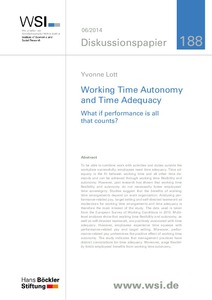Working time autonomy and time adequacy
"To be able to combine work with activities and duties outside the workplace successfully, employees need time adequacy. Time adequacy is the fit between working time and all other time demands and can be achieved through working time flexibility and autonomy. However, past research has shown t...
| Main Author: | |
|---|---|
| Institution: | ETUI-European Trade Union Institute |
| Format: | TEXT |
| Language: | English |
| Published: |
Düsseldorf
2014
HBS |
| Subjects: | |
| Online Access: | https://www.labourline.org/KENTIKA-19117308124919355809-Working-time-autonomy-and-time.htm |
| Summary: | "To be able to combine work with activities and duties outside the workplace successfully, employees need time adequacy. Time adequacy is the fit between working time and all other time demands and can be achieved through working time flexibility and autonomy. However, past research has shown that working time flexibility and autonomy do not necessarily foster employees' time sovereignty. Studies suggest that the benefits of working time arrangements depend on work organization. Analyzing performance-related pay, target setting and self-directed teamwork as moderators for working time arrangements and time adequacy is therefore the main interest of the study. The data used is taken from the European Survey of Working Conditions in 2010. Multi-level analyses show that working time flexibility and autonomy, as well as self-directed teamwork, are positively associated with time adequacy. However, employees experience time squeeze with performance-related pay and target setting. Moreover, performance-related pay undermines the positive effect of working time autonomy. The study indicates that management practices have distinct connotations for time adequacy. Moreover, wage flexibility limits employees' benefits from working time autonomy." |
|---|---|
| Physical Description: | 18 p. Digital |

